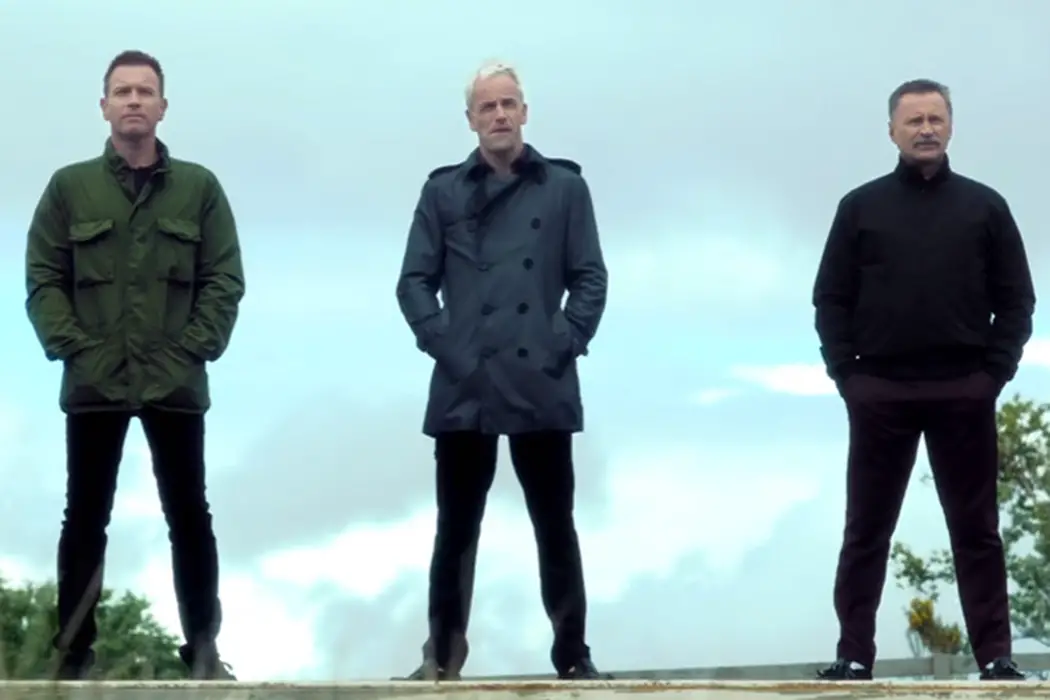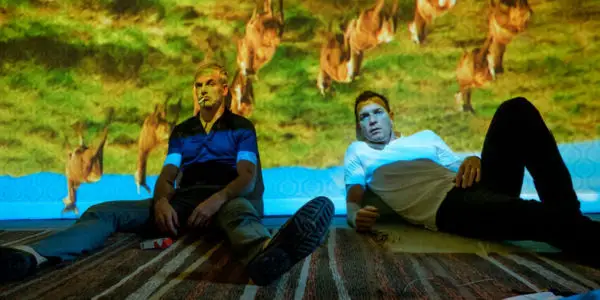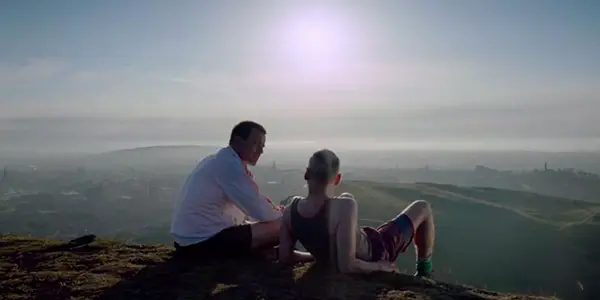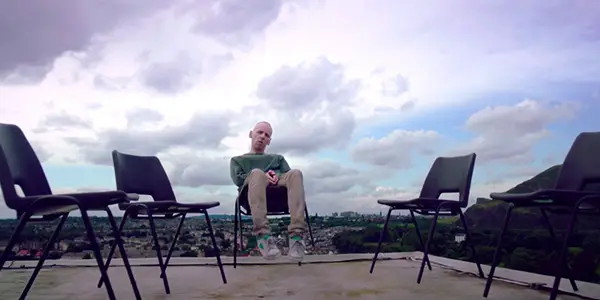T2 TRAINSPOTTING: Choose Nostalgia

Former film student from Scotland turned writer and film reviewer.
Choose life. Choose a job. Choose a career. Choose a family. Choose a f*cking big television, choose washing machines, cars, compact disc players, and electrical tin can openers. Choose good health, low cholesterol and dental insurance. Choose fixed-interest mortgage repayments. Choose a starter home. Choose your friends. Choose leisure wear and matching luggage. Choose a three piece suite on hire purchase in a range of f*cking fabrics. Choose DIY and wondering who the f*ck you are on a Sunday morning. Choose sitting on that couch watching mind-numbing spirit-crushing game shows, stuffing f*cking junk food into your mouth. Choose rotting away at the end of it all, pishing your last in a miserable home, nothing more than an embarrassment to the selfish, f*cked-up brats you’ve spawned to replace yourself. Choose your future. Choose life . . . But why would I want to do a thing like that? I chose not to choose life: I chose something else. And the reasons? There are no reasons. Who needs reasons when you’ve got heroin?
So began the seminal 1996 movie Trainspotting, as the roll call of characters were introduced to the punk pop beat of Iggy Pop’s Lust for Life: Mark Renton, the breakout role for a young Ewan McGregor, Sick Boy, the ever charismatic Johnny Lee Miller, Spud, Tommy, and the psychotic Begbie, powerfully imagined by Robert Carlisle.
As intros go, it was perfect; the zip-line editing, the upbeat music, the powerful oration on the futility of working class life in the Edinburgh backstreets, all of it was dynamic and irresistible. As well as catapulting McGregor into the mainstream, it also served as a icon for Cool Britannia that was ushered in by Brit Pop and Tony Blair’s New Labour, and inspired a wealth of similar films based around the drug scene in any given British city.
Trainspotting captured the rich dialogue, tangible characters and gritty substance of its subject so well that its presence as one of the biggest British films of all time is unrivaled. Ostensibly, you could argue its subject is about the attempt of heroin addict Renton to kick the stuff and move on with his life, but if anything Trainspotting was about life itself in a small Scottish pocket of the world, and how those inhabitants survived in that pocket.
T2 Trainspotting (loosely based around Irving Welsh’s follow up novel Porno) finds our iconic characters over twenty years later, as Renton returns to his Scottish roots to reconnect with the friends he betrayed all those years ago. Although it does have the same heartbeat-quick editing, and retains much of the sharpness of the original, it’s hard to escape the feeling that something is missing from this often-formulaic sequel.
A Little Too Familiar…
T2 opens on a similar theme as the original; we see an older Renton once again running, but this time his feet are padding on a treadmill and not the streets of Edinburgh with security guards in tow.
An incident leads him to return home from Amsterdam, where he fled after stealing his friends’ money in the first movie. In his absence, not too much has changed; Spud is still a junkie, now considering suicide; Sick Boy is still up to his tricks, running cons involving blackmailing horny old men caught on camera with the wrong woman; and Begbie, inevitably, has ended up exactly where you always assumed he would: prison. In the midst of this, Renton attempts to rekindle old friendships. His initial meeting with Spud saves the latter’s life after the distressed addict attempts to suffocate himself, then his encounter with Sick Boy initially fares no better, leading to a brawl in a pub that only a drunken lout at the bar could ignore.
Eventually they set aside their differences and set once again about conning their way to riches. Given the original’s status as encapsulating a Britain which was jaded by the Thatcher years and facing something of a crisis, the sequel presented an excellent opportunity to hold a mirror up to Brexit Britain. Instead, what T2 deals in is mostly nostalgia.

There are some great flourishes that show the potential – although Renton rehashes his Choose Life speech in a lazy, forced way, the speech itself is as thrillingly close-to-the-pulse (“Choose Facebook, Twitter, Instagram, and hope that someone, somewhere, cares”) as the original, and you find yourself wishing the film would skewer the current zeitgeist a little more – yet ultimately T2 relies on the audience’s knowledge and love of the first film to guide it along.
This isn’t to say T2 is a bad film, far from it; Danny Boyle only seems to get better and better as a director and the hallmarks of his – and frequent collaborator Anthony Dod Mantle’s – skills are evidenced here frequently. There is a terrific set piece scene were Renton and Sick Boy must infiltrate a protestant bar full of drunken men bitter in their hatred of Catholics. In order to prove themselves, the duo must take the stage and perform an improvised song. There is a beat or two as the tension rises before Renton tentatively gropes around for anything that rhymes with killing Catholics. Suddenly, the bar erupts in cheers as the two go for it full pelt.

There is a scene directly following the protestant bar which has Renton, Sick Boy, and Sick Boy’s Eastern European girlfriend Veronika get drunk and celebrate their scam. Renton and Sick Boy immediately launch into old stories of exploits from the first film and before; the effects of the cocaine take hold and they talk faster and faster, delving further into the past, reliving old glories. Veronika, clearly frustrated by this, tells them in her native tongue: “You just live in the past, you are clearly so in love with each other it’s awkward spending time with you, you should just get naked and f*ck each other”. It feels like she’s speaking directly about the movie, which, although a lot of fun most of the time, is frustratingly mired in nostalgia and its own sentiment that it can occasionally, as Veronika pointed out, be awkward.
This is best exemplified in a scene where Renton goes to seek legal advice from Kelly Macdonald’s Diane. In the first film, Diane was an integral part of the plot. A fifteen year old schoolgirl who tricks Renton into sleeping with her by lying about her age, she becomes something of an anchor to Renton’s chaotic, drug-addled life. In the sequel, she gets maybe five minutes of screen-time before nodding towards Veronika: “She’s too young for you, Mark”. It’s a wink and a nudge too far, a symbol of a film more interested in introducing you to old characters than it is with plot and substance.
Begbie’s Nature
As mentioned, T2 bears some hallmarks of its predecessor, and while it doesn’t seem interested in capturing pop culture like the first one, it still has some very good points to make. A scene near the beginning sees Spud explain to a therapy group that, due to his lack of knowledge on daylight savings, he is consistently an hour late for everything: for his job, to pick up his son, to sign on at the job centre, to attend a course on how to get a job. His speech about junkies not caring about daylight savings is a slightly poignant moment aimed at the current culture of benefit shaming – rather than give him the help he clearly needs, the system is content to habitually punish Spud. It’s not quite I, Daniel Blake, but in a movie stranded in the ’90s it’s nice to see them target something current.

Perhaps one of the most interesting aspects of T2 is the development of the dangerous sociopath Frank Begbie. In the original, Begbie is a force of nature, dragging everything down with him in a violent haze of narcissism and self-loathing. Take the famous scene in the original where he manages to start a bar fight by throwing a pint glass over a banister, and then challenging whoever threw the glass to a fight. He was the epitome of the seething anger of the working class, a man trapped by his own limitations. Where the others sought drugs to soothe themselves, Begbie always chose violence.
In the sequel, Begbie manages to escape from prison – in a slightly contrived way that suggests the police system in Scotland needs nothing more than a covering letter written on a post-it note to join it – and reunites with his wife and now grown up son. It’s his interactions with Frank Jr., a boy determined to study Hotel Management at college, that give Begbie’s character weight and, crucially, insight into his psyche that not only has you empathising with him at one point, but also finally clears up the mystery behind how the original film got its name.
In The End…
Ultimately, your view of T2 will depend on how you feel about the first Trainspotting. Although light in plot and substance, T2 retains the classic feel of the original and indulges in nostalgia to the point you feel at times you’re watching the first film all over again. While nowhere near as fresh or subversive, it’s still a very enjoyable movie in its own right.
If you find yourself reminiscing about the good old days of the ’90s and wishing you were younger, then this film will take you back again, but keep in mind there’s no substitute for the real thing – and T2 Trainspotting isn’t quite it.
T2 Trainspotting relies heavily on nostalgia for most of its run-time – do you think nostalgia is a good thing for sequels, or do you think they should try something different?
T2 Trainspotting was released in the UK on 27th January 2017, followed by a worldwide release on February 10th 2017.
Does content like this matter to you?
Become a Member and support film journalism. Unlock access to all of Film Inquiry`s great articles. Join a community of like-minded readers who are passionate about cinema - get access to our private members Network, give back to independent filmmakers, and more.












